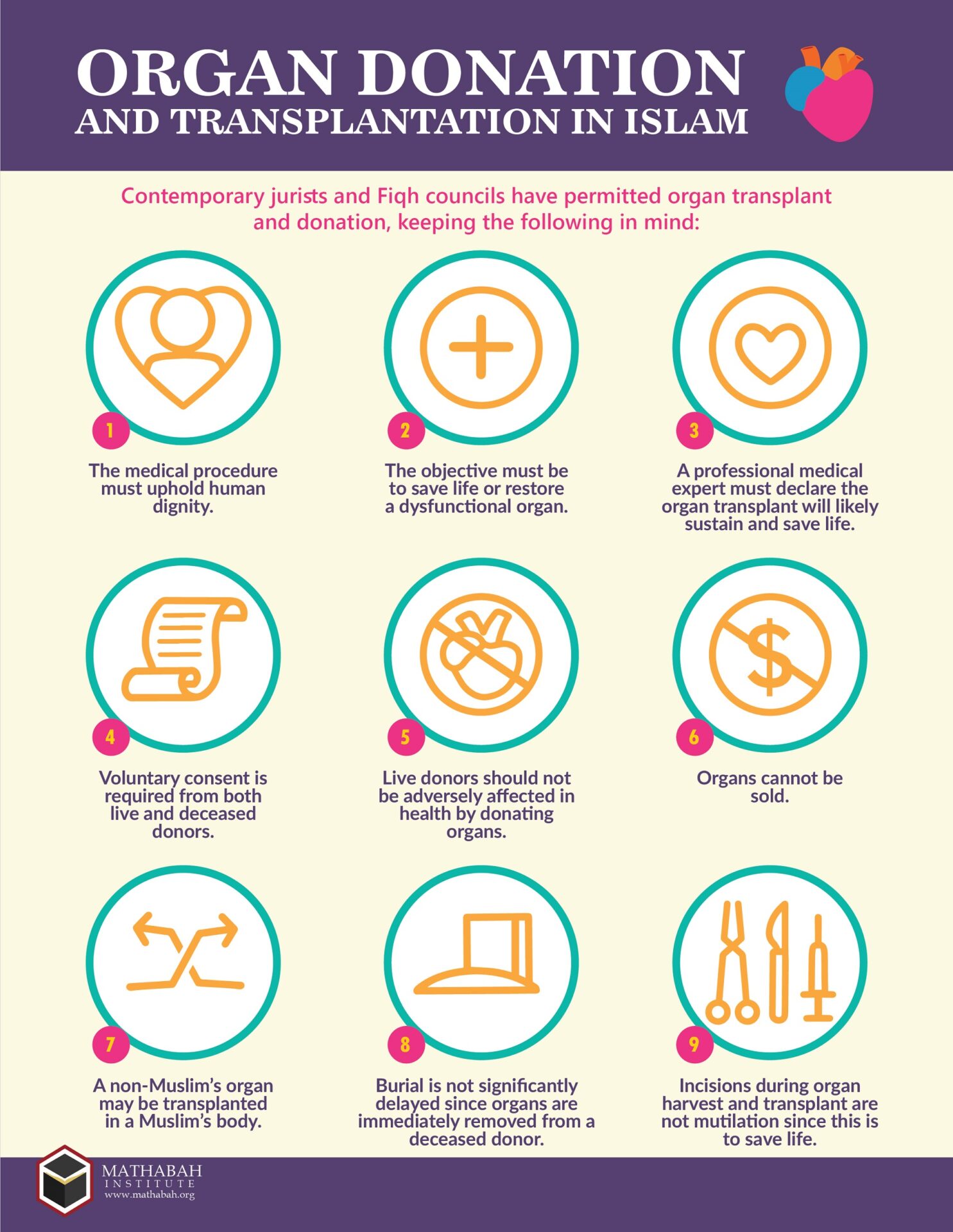Answered by Muftī Khālid Saifullāh Al-Raḥmānī
Formatted into English by Shaykh Yūsuf Badāt
Question:
Can Muslims accept and give blood transfusions? Is organ transplantation and donation permitted for Muslims?
Answer:
One of the methods of treatment is to acquire medical treatment through human body parts and organs. This can occur in various forms. Body parts and organs can be harvested from either the dead or from the living. These body fragments may be fluid or solid.
Human Fluids
There are some body fluids such as breastmilk that is considered ritually pure. Other body fluids such as blood, is classified as ritually impure. A ruling has been clearly indicated in mainstream jurisprudence manuals that after the designated period of suckling, for the purpose of medical treatment, one may benefit from a woman’s breast milk.
“There is no objection in an adult having a woman’s breast-milk for medication.” (Fatāwā Ālamghīrī)
Based on the analogy (qiyās) of breast-milk, majority jurists have permitted transfusing blood of a human into another. Both breast-milk and blood share the quality that once they exit, the body quickly recovers the deficiency.
Human Organs
As for acquiring medical treatment through solid human body parts, organs and tissues, it appears permissible due to the indications from reliable Islamic jurisprudence. The basis for this is that the Shāfʿīe school, most from the Ḥanafī school, Ibn ʿArabi of the Mālikī school and Abū al-Khitāb of the Ḥanbalī school have permitted the one in dire necessity and pressing need to consume the dead human, to sustain life.
“Imam Shāfʿīe and some of the Ḥanafī jurists have allowed [in a state of dire necessity], and in fact preferred to consume the dead body [for survival], for indeed the honour of the one alive is greater and more important [in comparison to the dead]. This view has also been adopted by Abū al Khitāb as well.” (Al-Mughnī)
Imam Qurṭubī has also written the same verdict. (Al-Jāmi’ Al-Aḥkam Al-Qurʿān)
Ibn ʿArabī’s view has been documented as follows, “The correct view regarding this matter is that one does not consume or eat a dead human unless it is established that it is the only way to save and sustain one’s life”. (Al-Jāmi’ Al-Aḥkam Al-Qurʿān)
Traditionally and typically, Islamic jurists have prohibited the use of human body organs of one who is alive. There is a ruling that can be found in most jurisprudence manuals that the mukrah (the one forced and compelled) to murder or to cut off a body part is not islamicaly permitted to kill or mutilate the human (See: Al-Badāi’ Al-Ṣanāʿi). In fact, some jurists have prohibited the one compelled to even cut or mutilate any of his or her own body parts (See: Qādhī Khan ʿAlā Al-Fatāwa Al-Hindiyyah). However, if one ponders and reflects with a deeper insight, it becomes evident that the prohibition was for this reason that in ancient times, a civilized skillful professional method of cutting the body and removing an organ did not exist, whereas this method and or procedure does exist today. In the olden days, operating to cut and remove an organ from someone alive would entail severe pain, difficulty and or the danger of death. It is for this reason, one was not permitted to cut their own body and consume it in a dire situation. Ibn Qudāmah has shed light on this with the following words, “Our evidence is that one who cuts and consumes their own body part will lead to self inflicted death. This tantamounts to suicide therefore, in such a situation one is more than likely to die.
In the modern era we live in, new advancements and professional medical procedures have come to the fore. This is the reason why, to use an organ of someone alive for medical purposes should be permitted.
At times, some prophetic reports and source texts are misunderstood. For example, the narrations that prohibit a woman to use another woman’s hair or the islamic legal texts suggesting that one cannot repair a broken tooth with a tooth of another person. To base the organ transplant discussion on these texts is incorrect. The reason for this is that to attach someone’s hair to another is not a pressing necessity rather mere beautification. As for teeth in today’s era, there are numerous substitutes to repair broken teeth through veneers and dental implants.
Modern organ transplant takes place, in pressing need and to save or sustain life. Such transplantation procedures are adopted where there is no other alternative for saving the life in question. Thus, we conclude by stating that organ transplant and donation will be permitted keeping the following in mind:
- The medical procedure adopted for organ transplant must uphold the dignity and honour of the human body.
- The objective of removing and transplanting the organ must be to save the life of a patient or to restore a dysfunctional organ of the body.
- A professional medical expert must be of the view that the organ transplant will most likely sustain and save the life.
- If the organ is being harvested from a deceased, he or she must have given consent to do so while alive. Voluntary consent is also required in the case of a live donor.
- The live donor should not be adversely affected in health and normal life by donating the organ.
- Organs cannot be sold.
Also, the following is worthy to note;
- A non-Muslim’s organ may be transplanted in a Muslim’s body.
- Burial is not significantly delayed since organs are immediately removed from a deceased donor.
- Incisions by surgeons during organ harvest and transplantation is not considered mutilation since the procedures are for saving and restoring life.
And Allāh Know Best

